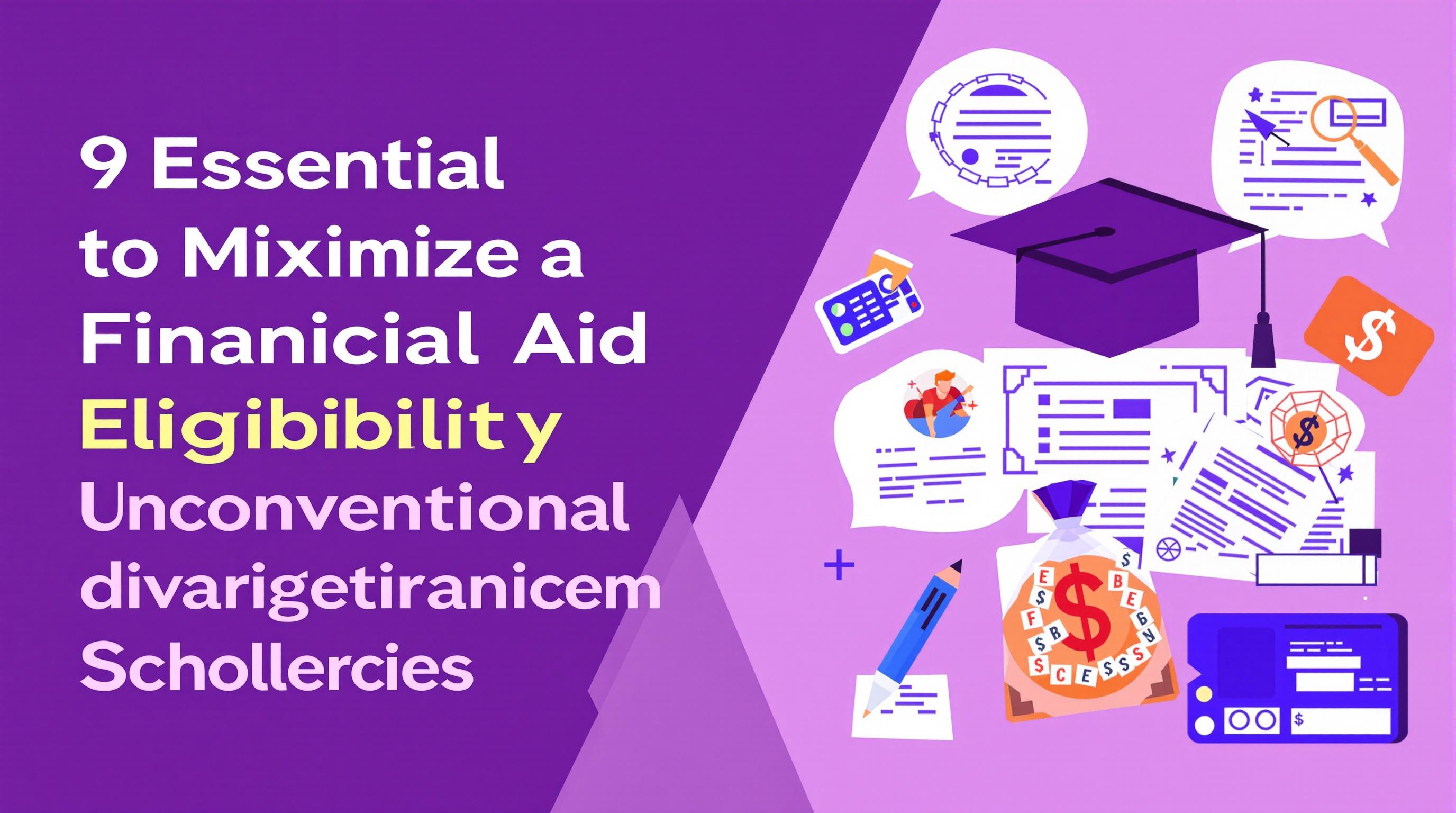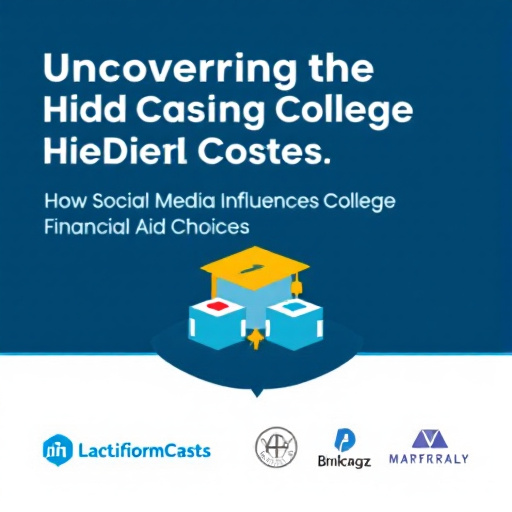Featured Articles
- 9 Essential Strategies to Maximize College Financial Aid Eligibility Through Unconventional Scholarship Sources
- From Grants to Gigs: How the Gig Economy is Shaping Modern College Financial Aid Options
- Redefining Financial Aid: How Social Media Influence Shapes College Funding Choices for Gen Z Students
- The Hidden Costs of College: How Unseen Expenses Derail Financial Aid Plans
- Top 6 Innovative College Savings Apps Released Since 2019 That Actually Boost Your Financial Aid Chances
9 Essential Strategies to Maximize College Financial Aid Eligibility Through Unconventional Scholarship Sources
9 Essential Strategies to Maximize College Financial Aid Eligibility Through Unconventional Scholarship Sources
9 Essential Strategies to Maximize College Financial Aid Eligibility Through Unconventional Scholarship Sources
1. Leverage Community Organizations and Local Businesses
While national scholarships get much attention, local opportunities often face less competition and can provide significant aid. Community organizations such as rotary clubs, local chambers of commerce, and small hometown foundations frequently offer scholarships tailored for residents or students in nearby schools. These smaller pools of applicants can increase your chances of success.
Local businesses also sometimes establish scholarship funds to support future talent within their community or industry. Reaching out to these organizations to inquire about available aid or application processes can uncover valuable opportunities that are not widely advertised.
Moreover, many local scholarships are designed with specific eligibility criteria relevant to your community, such as volunteering history or family background, making personalized applications more impactful. Therefore, researching and applying to local scholarships is a worthwhile strategy to maximize financial aid eligibility.
2. Explore Employer-Based and Union Scholarships
Many companies offer scholarships to the children of employees or even to employees pursuing further education themselves. Employer-based scholarships are often less well-known but can be highly rewarding. Checking with human resource departments or company intranets may reveal exclusive scholarship opportunities.
Additionally, labor unions frequently administer scholarship programs for members and their families. These scholarships are designed to support specific trades or industries but can sometimes be more broadly accessible depending on the union’s structure.
Because these scholarships often have unique eligibility criteria, such as employment status or union membership, it's important to stay informed about deadlines and application details through employer newsletters or union communications. Leveraging these unconventional sources taps into valuable aid channels otherwise overlooked.
3. Utilize Scholarships for Non-Traditional Students and Unique Backgrounds
Scholarships targeting non-traditional students — such as adult learners, veterans, or students returning after a hiatus — have grown in prevalence. These awards recognize the distinct challenges and experiences such students bring, offering aid outside the conventional high school or first-time college student population.
Similarly, scholarships for specific demographic groups, such as first-generation college students, underrepresented minorities, or students with disabilities, can provide significant aid. Many universities and private organizations maintain databases of such scholarships that cater to diverse backgrounds.
Applicants should seek out resources and organizations aligned with their unique experiences or demographic categorizations. Tailoring applications to highlight these attributes can yield increased eligibility for specialized funds that support educational equity and inclusion.
4. Tap Into Artistic, Athletic, and Hobby-Related Scholarships
Beyond academics, many scholarships reward talents in areas like the arts, athletics, and hobbies. Students who engage deeply in activities such as music, theater, sports, debate, or even niche hobbies like chess or robotics can find dedicated scholarships supporting these interests.
These scholarships often require portfolios, auditions, or competition results as part of the application but typically involve fewer applicants than general scholarships. This specialization can improve chances of obtaining financial aid while recognizing personal strengths.
Researching organizations connected to your interests—such as local arts councils or sports clubs—and applying for targeted scholarships offers avenues to both highlight personal achievements and reduce college expenses.
5. Investigate Religious and Cultural Organization Scholarships
Many religious organizations support students from their faith communities or cultural backgrounds with scholarship programs. These scholarships may require active membership, volunteer work, or adherence to the organization’s beliefs but generally have less competitive applicant pools.
Connecting with your local place of worship or cultural society can provide access to these resources. Some scholarships target students pursuing fields aligned with the organization’s mission or promoting cultural preservation and engagement.
Because these opportunities are often less publicized, direct engagement and building relationships within these communities are essential strategies. This approach can unlock important funding streams tailored to religious or cultural identity.
6. Seek Corporate Sponsorships and Brand Scholarships
Many corporations provide scholarships to enhance their community engagement or promote education in particular industries. Brand-sponsored scholarships can be found through extensive research, especially on company websites, social media, and scholarship aggregation portals.
These awards often focus on students preparing for careers related to the sponsoring company’s field, such as technology, healthcare, or engineering. Some large companies also run essay contests or competitions that award scholarships and internships.
Being proactive and monitoring corporate releases about scholarship offerings can help uncover these often-overlooked opportunities. Engaging with corporate social responsibility programs provides an additional channel for financial aid eligibility.
7. Explore Scholarships for Community Service and Leadership
Students with a strong record of volunteerism or leadership can access scholarships designed to reward civic engagement. Many nonprofit organizations, foundations, and local governments recognize community contributions through dedicated scholarship funds.
Demonstrating leadership roles, consistent volunteer efforts, or initiating local projects in your application can distinguish you from other candidates. Letters of recommendation from community leaders also strengthen applications in this category.
Showcasing how your service aligns with the scholarship’s mission can improve financial aid outcomes. Ultimately, leveraging your commitment to community betterment is an effective yet underutilized strategy for scholarship success.
8. Apply for Scholarships Based on Unusual Criteria
Some scholarships target very specific or unconventional traits, hobbies, or backgrounds. These might include awards for specific eye colors, left-handed students, or fans of certain genres or pop culture. Though they may seem quirky, these scholarships often have very limited competition.
Databases such as Fastweb or niche scholarship lists often catalog these unusual opportunities. Applying to such scholarships can increase a student’s chances of receiving aid with reduced effort compared to highly competitive general awards.
While not financially transformative on their own, combining several such awards can meaningfully contribute to overall financial aid packages. Being creative and open to unusual scholarship sources is a key strategy.
9. Use Scholarship Search Engines with Customized Filters
Online scholarship search engines enable tailored searches that focus on personal qualifications and unconventional opportunities. Websites like College Board, Fastweb, and Scholarships.com allow students to input detailed personal and academic information to uncover less obvious scholarships.
Employing filters for location, field of study, extracurricular activities, and unique demographics can reveal scholarships from novel sources. Regularly updating profiles ensures new awards are discovered as they become available.
Strategically using these tools maximizes the breadth of scholarship opportunities evaluated, improving the likelihood of financial aid eligibility. Consistent and thorough searching complements direct outreach to unconventional scholarship providers.
Bonus: Combine Multiple Strategies for Maximum Impact
Applying these nine strategies simultaneously can significantly improve your overall financial aid eligibility. Starting with local sources and expanding to employer, community, and specialty scholarships increases the diversity of potential awards.
Careful organization and meeting all application deadlines are essential, as is tailoring your applications to each scholarship’s unique criteria. Persistence, research, and creativity in targeting unconventional scholarship sources pay dividends.
By approaching financial aid with strategic intent and fully exploiting unconventional scholarships, students can meaningfully reduce the financial burden of college and open doors to broader educational opportunities.
References
Fastweb. (n.d.). Scholarship Search. Retrieved from https://www.fastweb.com/
College Board. (n.d.). Scholarship Search. Retrieved from https://bigfuture.collegeboard.org/scholarship-search
U.S. Department of Education. (2023). Financial Aid: Scholarships and Grants. Retrieved from https://studentaid.gov/understand-aid/types/scholarships




